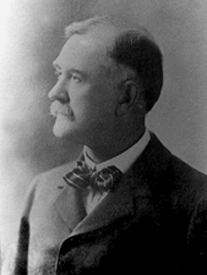
William Alexander Harris.
William Alexander Harris was a civil engineer and United States Senator from Kansas.
Harris was born in Loudoun County, Virginia, on October 29, 1841. He attended school at Luray, Virginia, until his eighth year, when his father, William H. Harris, was appointed minister to the Argentine Republic. For four years, the family lived in Buenos Aires. When they returned to the United States, he began his technical education and graduated from Columbia College in Washington, D.C., in June 1859.
Immediately afterward, he traveled to Central America and spent six months conducting a ship canal survey, but then returned home and entered the Virginia Military Institute in January 1860. He was in the graduating class of 1861, but the outbreak of the Civil War interrupted his studies. In April, he and his classmates enlisted in the Confederate service. He served three years as Assistant Adjutant-General of Wilcox’s Brigade and as Ordnance Officer of Generals D. H. Hill’s and Rodes’ divisions of the Army of Northern Virginia.
In 1865, he came to Kansas and entered the employ of the Union Pacific Railroad as a civil engineer. The road was then completed to Lawrence, and his first work was to build the Leavenworth branch, which he completed in 1866. Harris was the resident engineer of the road until it was completed to Carson in the fall of 1868.
He then bought land from the Delaware Indian Reservation and began farming and raising stock. In 1876, he became interested in short-horn cattle, and within a short time, his herds were known throughout the country for their high quality.
When he was nominated for Congressman-at-large by the Populists in 1892, he was in Scotland, comparing notes with breeders and planning to improve his stock. His nomination was endorsed by the Farmers’ Alliance and the Democratic Party, and he was elected. In 1894, he was re-nominated but defeated. In the fall of 1896, he was elected to the State Senate from the Third District, and the following January, he was elected to the United States Senate to succeed William A. Peffer. Harris took an active part in railroad legislation in Kansas and Congress, but was unable to have his ideas carried out. He was deeply interested in the Nicaraguan Canal Project when it came before the United States Senate and served as a committee member in charge of the proposed canal. When that question came before Congress for settlement, he saved millions for the government in the Union Pacific Railroad claims.
Although an ex-Confederate, he remained loyal to his state and country, voting for what he deemed best, and demonstrated true statesmanship. After retiring from the United States Senate, he made one political campaign as the Democratic candidate for governor of Kansas.
From 1906, he resided in Lawrence, Kansas, although he was connected with the National Livestock Association, which had its headquarters in Chicago, Illinois.
He was appointed regent of the State Agricultural College at Manhattan, Kansas, and took an active interest in developing that institution, as well as the United States experimental stations.
He died at his sister’s home in Chicago, Illinois, on December 21, 1909.
©Kathy Alexander/Legends of Kansas, updated September 2025.
Also See:
See Sources.
